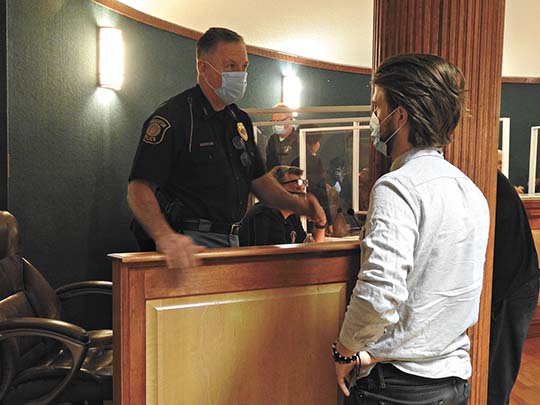Houghton chief reflects on protests

Garrett Neese/Daily Mining Gazette Houghton resident Gabriel Ahrendt, who called to defund the Houghton Police Department at last week’s City Council meeting, speaks with Police Chief John Donnelly after the meeting.
HOUGHTON — Nobody hates a bad cop more than a good cop, Houghton Police Chief John Donnelly said.
“Just because you go through a police academy, that does not make you a good person,” he said. “And I do believe it is a huge responsibility as a police chief to make sure that you’re putting good officers out on the street … I think the better we do that as law enforcement. That would be the best way to regain public trust.”
Donnelly reflected on recent protests sparked by the killing of George Floyd by a Minneapolis police officer, including several held on the Portage Lake Lift Bridge.
Asked what he made of the protests, Donnelly said he feels he has a noble job, though he does not feel departments are above change. Professional policing traces its roots back to the London Police Department, formed by Robert Peel in 1829, and has continued evolving since then.
One of the most common policy suggestions among protesters is to defund the police by moving resources into other community agencies such as conflict negotiators or mental-health professionals.
Members of the public have asked the Hancock and Houghton city councils to consider defunding the police at recent meetings.
While Donnelly condemned bad policing, he said cops can be thrust into situations requiring split-second decisions. With good funding, he said, a department is better able to train officers, and better able to attract high-quality candidates in the first place.
“Well-educated people aren’t going to want to go to places that are being defunded,” he said. “On the contrary, the city has done a great job of funding our police department and allowing us to train in allowing us to become well-rounded people.”
He also questioned the idea of eliminating jails or prisons, noting that several people had thanked him later and told him their arrest and time in jail had helped them.
The department partners with other agencies, such as the Barbara Kettle Gundlach Shelter and Dial Help. Donnelly said while he would like to see mental health programs funded better, he thinks police still need to be part of the initial response. He noted 70% of the people in the department had won lifesaving awards, he said.
“Law enforcement is one of the few places that can actually physically take somebody into custody,” Donnelly said. “Well, that comes with great responsibility. And it’s a difficult and a dangerous situation when you try to take some of these freedoms away. But I do feel that the better-funded the law enforcement agency is, the better trained, you’re going to attract the proper employees and you’re going to get good results.”
Donnelly sympathized with protestors who said the range of police activities — shoplifting complaints, domestic violence complaint, mental health issues — should be spread across more than one agency. But although they bring in other partnering agencies during the case, Donnelly still sees police as the best agency to initially respond.
“In our small communities, there might be five or six law enforcement officers,” he said. “That’s the only first responders you have that can immediately go in, accompanied by volunteer firemen and Mercy EMS, but they only have two or three people. That’s not a lot of people and it would be truly an overwhelming expense to try to say that you’re going to have all these other agencies respond.”
The department has undergone numerous forms of training, including learning how to respond to sexual assault complaints, domestic violence complaints, or death notifications. The department is also working on diversity training with Michigan Technological University, Donnelly said.
“We’re willing to learn, and we’re willing to change where it’s needed,” he said.
As part of defensive tactics training, the department had worked on ways to properly arrest people. When one officer briefly kneeled on a person’s neck — some months later, the method by which a Minneapolis officer killed George Floyd — the instructor corrected him.
In one current project, the department is working with Dial Help to have one professional person to conduct interviews with child sexual assault victims, to reduce the number of people to whom a victim has to tell their story.
One critique made by protesters is that formal training only goes so far. The 8 Can’t Wait package of police reforms, which include banning chokehold and requiring exhausting all alternatives, has been criticized as too incremental by people who noted that many were already in the departments being protested for their conduct. (For instance, the Minneapolis Police Department had already adopted seven of the eight policies at the time of George Floyd’s killing.)
Donnelly said the Houghton department also has a culture that makes sure officers continue the lessons of their training sessions once they’re back out on the job.
“In a small community, I always preach this: Today’s suspect is going to be tomorrow’s witness,” he said. “We’re going to see that person in Walmart tomorrow. It’s a small community, you’d better treat people right.”
Donnelly said he sees the department’s role as not just performing arrests, but also working within the community, citing events such as Treat Street or the Victorian Christmas.
“We need to know what our community wants, know what they’re feeling and how we can help and be part of it,” he said. “Most people in this community will say that. Everybody knows a police officer here. It’s their neighbors, their family members or friends. And that’s the way it should be everywhere.”
Donnelly said he agreed with protestors’ critique of officers from some larger departments being alienated from communities they serve but don’t live in. Most of the officers grew up in the area, although Lt. Nick Roberts grew up downstate, Donnelly said.
“Change is slow,” he said. “But I think training and education can help you immensely when it comes to that. And if your law enforcement agency’s diversity matches the community that it lives within, that makes a lot of sense to me.”
Racism is not tolerated within the department, Donnelly said. He said the department also does not have the “curbside mentality” of some of the departments that have made news, where officers inflict gratuitous pain in the course of an arrest.
Most agencies, including Houghton, will do a $5,000 to $6,000 background investigation on a candidate to see if they have temper problems or assaultive behaviors, including dishonesty and racism. With a shortage of officers nationally, underfunded departments are more likely to loosen those standards, he said.
“We have definitely chosen very carefully who we hire here,” he said. “If some people just don’t belong in this profession, we’ve made sure they don’t work here.”


